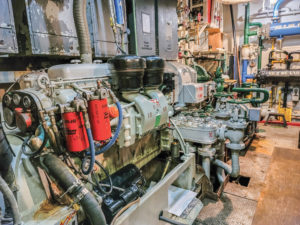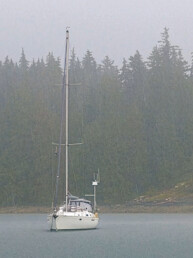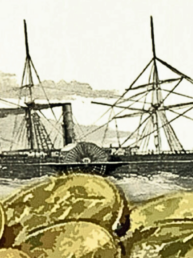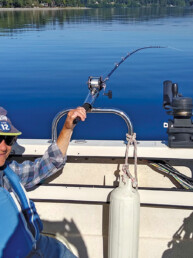(Caption) Engine room of the Maritime Instructor (Seattle Maritime Academy training ship). All engines are equipped with spin-on or cartridge style filters.
This article was originally published in the February 2022 issue of 48° North.
Filters play a large part onboard our boats in a variety of capacities. From fresh water filters, sea strainers, fuel/water seperators, even coolant filters — all of these filtration systems provide a crucial function for the many important components they support.
Two of the most common filters with which our engines are equipped can be the difference between an operating engine and one that’s non-operational: fuel filters and oil filters. Both of these are absolutely critical for efficient performance of a diesel engine. Most diesels have an oil change interval of approximately 100-250 hours between oil changes, or annually regardless of hours. If neglected, they can and will strand you.
But how many of us think about our filters until it’s too late? The typical call I get that leads me to discover clogged filters begins like this: “My engine has no power,” or “the engine died,” or “the engine just won’t start.” While this is one unfortunate outcome, it is important to think about what really happens when our oil filters get clogged, and the damage it causes when they are not changed regularly.
Let’s start with a diesel engine’s oil lubrication system. Oil is literally the lifeblood of the engine, as it is chemically engineered to withstand thousands of heat cycles as the engine operates without breaking down and becoming acidic. It is also a hydraulic fluid that can move thousands of pounds of weight as it will not compress much and will not mix with water easily. Thermodynamically, it is capable of removing a significant amount of heat from the engine block to keep it within optimal operating temperatures. Oil also has detergents in it to help keep carbon deposits at bay and it suspends particulates so they can be removed from the engine via filter(s) and oil changes. It is truly impressive stuff!
There are no specialized “marine” oils or filters. Oil does exactly the same thing on a boat as it does on an automobile — it goes through the same wear and tear, and handles the same pressures. The presence of corrosion can set in with a sitting engine (but we’ve already talked about that), and oil can be less contaminated with dirt and silicon since it is not on the road. However, the basic applications and change intervals are identical.
Oil technology has changed little in the past 100 years for a simple yet good reason — it works. Accordingly, a lot of the advice about oil and filter changes seems to be common knowledge. But what if those limits are pushed and oil and filters are neglected? If you’re using a synthetic oil, does that mean you can push the limits of the oil onto the filter? Is filter technology that different from manufacturer to manufacturer?

The first oil filter was invented in 1923 by a man named Earnest Sweetland. Prior to the first filters, engines either had no filter at all or only used metal screens. While this was somewhat ok for the slower turning engines of yester-year, this hardly flies for modern engines. During the 1920s to 1950s, cartridge-type filters with fabric or paper elements became standard for many engines, and while changing them was messy and more time consuming, they worked relatively well and are still used on some engines today. Typically, I see them on older diesels such as Detroit Diesel 71 series engines, but also on some new engines such as Paccar MX engines found in semi trucks. Spin-on filters became mainstream around the 1950s because they were clean and easy to change, which is why they are a fixture on nearly every engine you see today.
Oil filters do the essential job of protecting the engine from a variety of contaminants that are found within the engine oil. Engines have many parts where there is metal-on-metal contact, and oil creates an extremely thin barrier in between each of those parts so they never really touch — but instead “float” across one another as the parts move. Engine oil can withstand this great pressure but, in doing so, will pick up contaminants. Oil will suspend metallic particulate, water, and dirt (silicon particulate), and bring it back to the filter which can capture most of it. Modern oil filters are equipped with paper or synthetic fibers, even steel mesh. High-end filters even contain magnets to capture super fine metal particulate. Today’s filters are mostly equipped with anti-drainback valves and bypass valves, each element providing a critical function. The anti-drainback valve keeps the filter primed so, when the engine is started up, important parts aren’t left dry for the first few seconds of the engine running. Bypass valves are spring-actuated and will open if the filter becomes clogged, so the filter will bypass dirty oil. This is done because dirty oil is better than no oil at all.
On much larger applications such as in ships, centrifugal filtration is used as opposed to standard spin-on filters, and is circulated for much longer as there is typically much more volume. Larger applications may also use duplex or even triplex filter systems, which consist of two or three filters inline with each other so they can be changed while the engine is in operation. Many commercial applications have engines that run for years without being shut down, so having the capability to bypass filters and some oil is critical so the engine can continue to run despite an oil change. Recreational vessels, for the most part, use engines with standard oil pans and filters — thus, they must be stopped to change the oil.
Many of us have some experience changing oil and filters on our boats, but nearly everyone’s most familiar context for oil and filter changes is our cars. This can add to our perspective about our boat engines. The operator’s manual on my car indicates I could wait 5,000-7,000 miles before doing an oil change because the engine uses synthetic oil. While it is true that synthetic oil can hold up for a significantly longer period then standard mineral oil, I know the manufacturer’s standard filter was a cardboard and paper filter that most definitely can NOT be relied upon to hold up for 5,000-plus miles without falling apart or clogging up. Accordingly, I spend a bit more money by changing my oil every 3,000 miles instead of 5,000, ensuring my engine would be in good operation for many more years without any issues related to poor filtration.
We can think similarly about our boat engines, and hope to understand whether the oil or the filter performance may be the weaker link. Researching different diesel engine manufacturers and the technology they use for their oil filtration systems, I was very surprised to find out which manufacturers were cheap on their oil filters. As an experiment with my students one day in my advanced diesel class, we cut open about 20 different diesel oil filters from several manufacturers and were struck by how many of them were poorly made, but were conversely impressed with how well some others were made. This confirmed my theory that changing diesel oil at slightly more frequent intervals could do the engine good, considering the variation in oil filter quality. The engine oil may be fine, but the filter may not be by the end of the service interval.
Oil filtration is just as critical as the oil itself. Clean oil can keep an engine running non-stop for years, while dirty oil can cause severe wear and failure in a short period of time. An engine with dirty oil will not run very long. Filters are cheap compared to an extensive repair or the cost of a new engine. If in doubt, change them sooner than later. A freshly lubricated engine is a happy engine.






